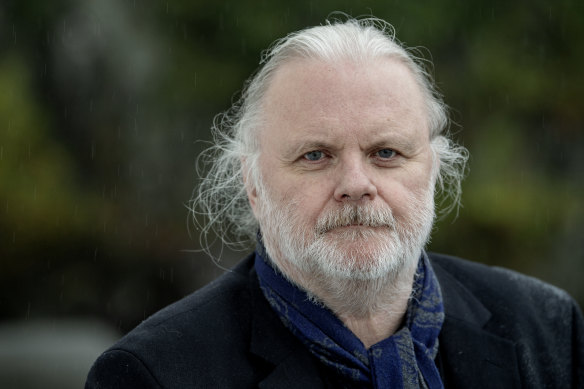Jon Fosse, this year’s winner of the Nobel Prize for Literature, has translated the Australian writer Gerald Murnane’s novel The Plains into Norwegian. He feels that he and Murnane have something in common.
“To meet a literary voice that really talks to you, it’s rare,” he told Merve Emre in the New Yorker in 2022. “I feel that Murnane has a quite unique voice and way of seeing. I’ve never read anything like The Plains, but it resembles my writing, this sense of distance and closeness. We are writing in different ways, but I can tell that there’s a similar way of seeing that’s behind it.” Fosse is now translating Murnane’s Barley Patch.
Norwegian author Jon Fosse, who this month won the Nobel Prize for literature.Credit: Getty
It’s no coincidence that Fosse and Murnane have long been favoured candidates for the Nobel literature prize. They sit somewhere outside the mainstream, but both have ardent disciples who respond to their high seriousness and deep dedication to the word and to the human condition.
Of the two, it’s Fosse who is the better known, particularly in Europe. His career spans more than 70 novels, poems, children’s books, essays and plays. He writes in Nynorsk, spoken by about 10 to 15 per cent of the Norwegian population, and his works have been translated into 50 languages. His plays are performed around the world and his writing has been compared to Bernhardt, Ibsen and Beckett. But it’s only recently that his books have appeared in English translation.
In Australia, Giramondo has published his masterpiece, the seven-novel series Septology, in one volume. It is over 700 pages of one single sentence. That sounds daunting, but I am keen to tackle it after reading Ruth Margalit’s comment: “Something in the critical self is shed in the process of reading Fosse, only to be replaced by something more primal.”
Fosse is currently translating Gerald Murnane’s Barley Patch inot Norwegian.Credit: Getty
One problem with introducing Fosse to the reader is that a simple synopsis of his stories doesn’t explain much. Septology is an existential crisis tale about an ageing painter, Asle, who becomes involved with a doppelgänger, a wretched alcoholic. (These could be alter egos for Fosse himself at different stages of his life). As his English translator Damion Searls says, his books sound terrible when summarised but are powerful and moving when actually read.
You could say his writing is religious (he converted to Catholicism) or philosophical, but that doesn’t account for the emotion it arouses. Searls says in The Atlantic that one of Fosse’s books was the only book that ever made him cry when translating “and then his next book did it to me again”. Although Fosse has a reputation for being avant-garde or inaccessible, Searls believes he is the exact opposite: “His work speaks to everyone.”
Searls recommends newcomers to Fosse start with Septology, but another writer, Catherine Taylor, suggests in the UK Guardian that a good introduction would be the short stories in the 2018 collection Scenes from a Childhood.
In the New Yorker interview, Fosse says that he began to write at 12, and found himself in a private and secure space where he still likes to stay. It is safe and also scary, because it’s a way to enter the unknown. But “when I’m writing well, I have this very clear and distinct feeling that what I’m writing on is already written. It’s somewhere out there. I just have to write it down before it disappears.”
The Nobel judges said they gave the prize to Fosse for giving “voice to the unsayable”. And in his work, the unsayable emerges almost despite the writer. “Your writing is wiser, and it knows more than you as a person know.” Fosse says.
The Booklist is a weekly newsletter for book lovers from books editor Jason Steger. Get it delivered every Friday.
